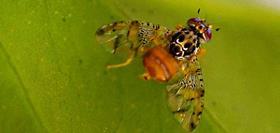
A genetically engineered fruit fly with a female-specific lethal gene could be a ‘promising new tool’ in the fight against the Mediterranean fruit fly, new research has said.
A study published todayby the University of East Anglia and biotech company Oxitec showed how releasing genetically engineered male flies into the wild population leads to population collapse, as the species is unable to reproduce. It works by introducing a female-specific gene into the insects, that interrupts development before females reach a reproductive stage.
The technique is being touted as a safe and efficient alternative to the Sterile Insect Technique (SIT), which irradiates flies to make them sterile before releasing them into the wild. Researchers say irradiated flies are weakened, and therefore unlikely to mate as well as the genetically engineered flies.
“The Mediterranean Fruit Fly infests more than 300 types of cultivated and wild fruits, vegetables and nuts. It is a real pest to agriculture and causes extreme damage to crops all around the world,” said lead researcher Philip Leftwich.
“Of all of the current techniques used to control these flies, SIT is considered the most environmentally friendly as it uses sterile males to interrupt matings between wild males and females. The down side is that these males don’t tend to mate as well in the wild because the irradiation method used for sterilisation weakens them.
“The genetically engineered flies are not sterile, but they are only capable of producing male offspring – which rapidly reduces the number of crop-damaging females in the population.
“When we tested the release of the genetically modified male flies, we found that they were capable of producing rapid population collapse in our closed system.
Researchers tested the technique on lemon trees in secure eight-metre greenhouses at the University of Crete.
“This method presents a cheap and effective alternative to irradiation. We believe this is a promising new tool to deal with insects which is both environmentally friendly and effective,” Leftwich added.
The next stage of the research, entitled ‘Genetic elimination of field-cage populations of Mediterranean Fruit Flies’, will be to gain approval for open-field studies.
It was published today (13 August) in the scientific journal Proceedings of the Royal Society B, and funded by the Natural Environment Research Council and Oxitec.
The Mediterranean fruit fly is currently controlled by a combination of insecticides, baited traps, biological control and SIT.






No comments yet